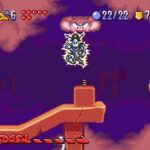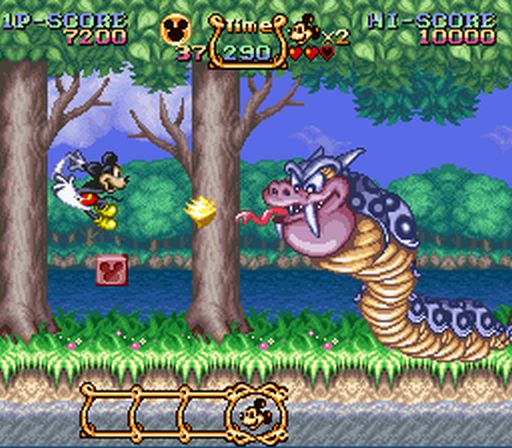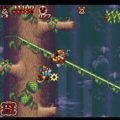Developer: Sun L Publisher: Capcom Release: 10/94 Genre: Platformer
Of all the Disney Afternoon shows Bonkers is the one I am the least fond of. It is not that it was a bad show, but Darkwing Duck is a hard act to follow. The show’s weird production meant its 65 episodes fluctuated in tone. The Lucky episodes presented Bonkers as a naïve idiot who means well but causes chaos by accident. The Miranda episodes made him a complete idiot who is unlikable. It is hard to like the character when his portrayal is so inconsistent. So it goes without saying that I was not looking forward to the inevitable video game adaptation. The Sega Genesis game was clearly not a priority at Sega and came and went like a wet fart. Capcom and their development partner Sun L however have turned in a solid effort.
Three of Toontown’s most precious artifacts, the Mermaid’s Voice (from the Little Mermaid), the Magic Lamp (Aladdin) and the Sorcerer’s Hat (Fantasia) have been stolen by a mysterious culprit. Bonkers and his partner Lucky Piquel attempt to take on the case but due to Bonkers clumsiness his partner is hospitalized, leaving him to go it alone.
Bonkers does not stray far from the traditional platforming mold. For most enemies you will use the staple butt bounce. It is simple yet effective and will carry you through the majority of the game. Bonkers also borrows a page from Konami’s Buster Busts Loose as you can also dash forward in a burst of speed. While dashing you can mow through enemies and certain objects and roll through tight passages. There is a short cool down between bursts so you cannot spam it. Unlike that title however it is not as core a mechanic and does not see as much use. It is too bad as it could have added an extra dimension to gameplay.
For sturdier enemies or ones that have spikes or flames you can use your limited supply of bombs to take them out. Bombs can also destroy objects, mainly balloons to collect items. You start with only five but with every ten badges you collect it increases by one. The game is a bit stingy at replenishing bombs and will even waste them with empty balloons. You do not want to go in to the boss battles low on stock so it is imperative to increase your maximum supply as soon as possible, both because they are fun to play around with and because they make the game easier. Here the game goes out of its way to do so as badges are the game’s equivalent of coins or rings.
The show’s premise gives the game an excuse to explore a wide variety of literal set pieces. The various sets around Hollywood encompass a number of your typical video game levels like a haunted house and cruise ship. But it is their design that makes them fun to explore. Most levels have a high road with plenty of riches to for those with the skill to reach it. For as much as I do like the level design there is the feeling of missed opportunity. There are so many instances where the dash mechanic could have been better integrated in the game. The few instances toward the end show this and are cool and show what could have been.
But therein lies the “problem”. Bonkers is competent but not exceptional. It succeeds at what it sets out to do and nothing more. Early in the system’s life that was enough. But by 1994 with such fierce competition it falls pretty low on the priority scale of platformers. When you have seminal Disney titles like Aladdin, World of Illusion, and the Magical Quest series (from the same publisher no less) it is kind of hard to settle. The bar was pretty high for this license.
Like most of Capcom’s Disney titles Bonkers is easy overall even without the passwords present in the Japanese version. The game’s slow pace lends itself to exploration rather than all out action. If you do even the slightest bit of exploration you will find plenty of badges to carry more bombs and more importantly heart containers to increase your life bar. The levels are sparsely populated and the platforming is moderate at best. The only challenge comes from the boss battles. If you enter each with a full complement of bombs they are simple. Without them they can be difficult. That aside the game is clearly intended to be accessible and it succeeds at that.
In Closing
I did not expect much of Bonkers. The show despite its interesting premise was middling, a fact that is easy to see as most do not remember it. But Capcom and Sun L proved me wrong. This is a solid game, one that hits all the right notes and does not rock the boat either. While I like Bonkers it is near the bottom of Capcom’s Disney efforts on the SNES which is not a knock against it; Capcom were firing on all cylinders back then. This makes for a good buy at a cheap price.









